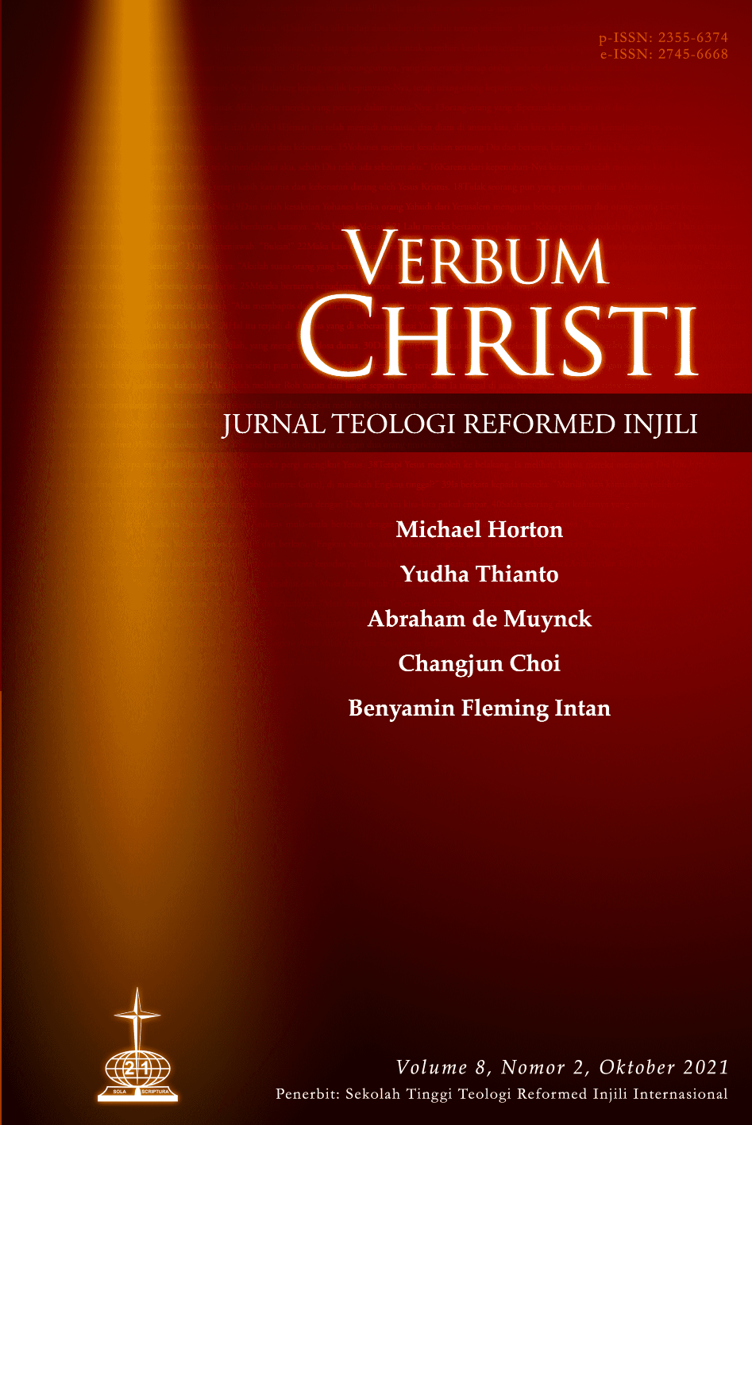Theology In The Classroom
How Tensions Help Teachers Reform Their Ideas On Education
DOI:
https://doi.org/10.51688/VC8.2.2021.art3Kata Kunci:
pedagogi, wawasan dunia, praktek dalam kelas, refleksiAbstrak
Guru-guru kristen biasanya tidak mengaitkan teologi dengan praktek profesional mereka. Artikel ini mengeksplorasi alasan-alasannya, dimana semuanya terkait dengan bagaimana teori berfungsi di dalam kegiatan mengajar. Teori biasanya mulai diperhatikan ketika persoalan-persoalan praktis timbul, tetapi konsep-konsep teologi bukanlah hal pertama yang diperhatikan. Artikel ini menyatakan bahwa ketegangan-ketegangan yang dialami para guru di praktek merupakan pemicu-pemicu untuk refleksi teologis. Hal ini sejalan dengan panggilan bagi orang kristen untuk menguji dan mengetahui kehendak Allah (Rom. 12:2). Para guru sudah seharusnya mampu merefleksikan akan tiga dimensi dimana ketegangan-ketegangan dapat dikenali. Pertama, respons terhadap ide-ide kebudayaan umum. Kedua, panggilan untuk visi teologis bersama di dalam tim sekolah. Terakhir, ketegangan-ketegangan eksistensial mencari solusi-solusinya di dalam bahasa teologis. Rekrutan para guru kristen harus dilatih untuk merefleksikan tiga tingkatan tersebut.
Unduhan
Referensi
Alleman, N. F., P. L. Glazer, and D. S. Guthrie, “The Integration of Christian Theological Traditions into the Classroom: A Survey of CCCU Faculty.” Christian Scholars Review 45 (2016): 103–124.
Alii, E. T. Godsdienstpedagogiek. Dimensies en spanningsvelden [Religious education: Dimensions and fields of tension]. Zoetermeer, 2009.
Bruin, L. Boele-de and A. de Muynck. “Exploring the Professional Ideals of Christian Teachers from Conservative Christian Schools in the Netherlands.’ Journal of Christianity & Education 22 (2018): 8–22.
Cameron, H., et al., Talking about God in Practice: Theological Action Research and Practical Theology. London: SCM Press, 2010.
Clandinin, D. J. and F.M. Connely. Narrative Inquiry: Experience and Story in Qualitative Research, ed. F. M. Connelly. San Francisco: Jossey-Bass, 2000.
Enright, R. D. and R. P. Fitzgibbons. Helping Clients Forgive: An Empirical Guide for Resolving Anger and Restoring Hope. Washington: APA Books, 2000.
Fives, H. and M. Buehl, “Spring Cleaning for the Messy Construct of Teachers’ Beliefs: What Are They? Which Have Been Examined? What Can They Tell Us?” in APA Educational Psychology Handbook: Vol. 2. Individual Differences and Cultural and Contextual Factors, ed. K. R. Harris, S. Graham, and T. Urdan. Washington DC: American Psychological Association, 2012.
Hanes, P. Evangelical Theology and Philosophy: Improving a Difficult Relationship. Wroclaw: EWST Centrum Educacyjne, 2020.
Heschel, A. J. Wie is de mens? [Who is the human being?]. Baarn: Ten Have, 1992.
Huttinga, Wolter and Roel Kuiper, ed. Mens worden. Over de relatie tussen theologie en pedagogiek [Becoming a human being. About the relationship between theology and pedagogy]. Amsterdam: Buijten en Schipperhein, 2021.
Kelchtermans, G. “Who I Am in How I Teach Is the Message: Self‐understanding, Vulnerability and Reflection,” Teachers and Teaching 15, no. 2 (2009): 257–272. DOI: 10.1080/13540600902875332.
Kock, J. de. “Educational Change and Christian Ideology: How Identity Shapes Educational Innovation.” Christian Higher Education 8 (2009): 304–326.
Korthagen, F. A. J., ed. Linking Practice and Theory: The Pedagogy of Realistic Teacher Education. Mahwah NJ/London: Routledge, 2001.
Kuiper, R. “Articulatietekort. Over de menselijke zin in de praktijk van het onderwijs” [Articulation deficit: About human meaning in educational practice], in Waar is onderwijs goed voor, ed. C. Hermans. Eindhoven: Damon, 2020.
Kurzban, R. Why Everyone (Else) is a Hypocrite: Evolution and the Modular Mind. Princeton, NJ: Princeton University Press, 2010.
Markus, H., G. Bertram-Troost, J. de Kock, A. de Muynck, and M. Barnard, “Stimulating Inquisitiveness: Teachers at Orthodox Protestant Schools about Their Roles in Religious Socialization.” Religious Education 114 (2019): 513–527.
Muynck, A. de. Een goddelijk beroep. Spiritualiteit in de beroepspraktijk van leraren in het orthodox protestants christelijk basisonderwijs [A godly vocation: Spirituality in the professional practice of orthodox protestant primary school teachers]. Heerenveen: Groen, 2008.
______. “Vergeving: een kwestie van opvoeding?” [Forgiveness: A matter of education?], in Vergeving. Verkenningen van een delicaat thema [Forgiveness: Explorations of a delicate theme], ed. E. Peels. Apeldoorn: Theologische Universiteit, 2020, 109–120.
Noordmans, O. Herschepping [Recreation]. Amsterdam: Holland, 1956.
Pirner, M. L. “Religious Beliefs and Professional Beliefs of (Not Only Religious Education) Teachers: Research Findings on Their Relationship and Conclusions for Teacher Training,” in Religious and Values Education: Contextual Challenges, ed. L. Francis and D. Lankshear. London: Peter Lang, 2019.
Schön, D. A. The Reflective Practitioner. How Professionals Think in Action. New York: Basic Books, 1983.
______. Educating the Reflective Practitioner: Toward a New Design for Teaching and Learning in the Professions. San Francisco: John Wiley & Sons, 1987.
Sennett, Richard. The Craftsman. New Haven, CT: Yale University Press, 2009.
Taylor, C. A Secular Age. London: Harvard University Press, 2007.
Walt, H. Van der. “The Possible Impact of Reformed Theology on Education as a Science, with Special Reference to the Situation in South Africa (1940–),” In die Skriflig 54 (2020), 4.
Walt, H. van der, A. de Muynck, N. Broer, C. Wolhuter, and F. Potgieter. “The Need for and Possibility of a Christian Forgiveness Education in Schools,” Journal of Research on Christian Education 27 (2018): 101–108.
Unduhan
Diterbitkan
Cara Mengutip
Terbitan
Bagian
Lisensi
Hak Cipta (c) 2021 VERBUM CHRISTI: JURNAL TEOLOGI REFORMED INJILI

Artikel ini berlisensi Creative Commons Attribution-NonCommercial 4.0 International License.




